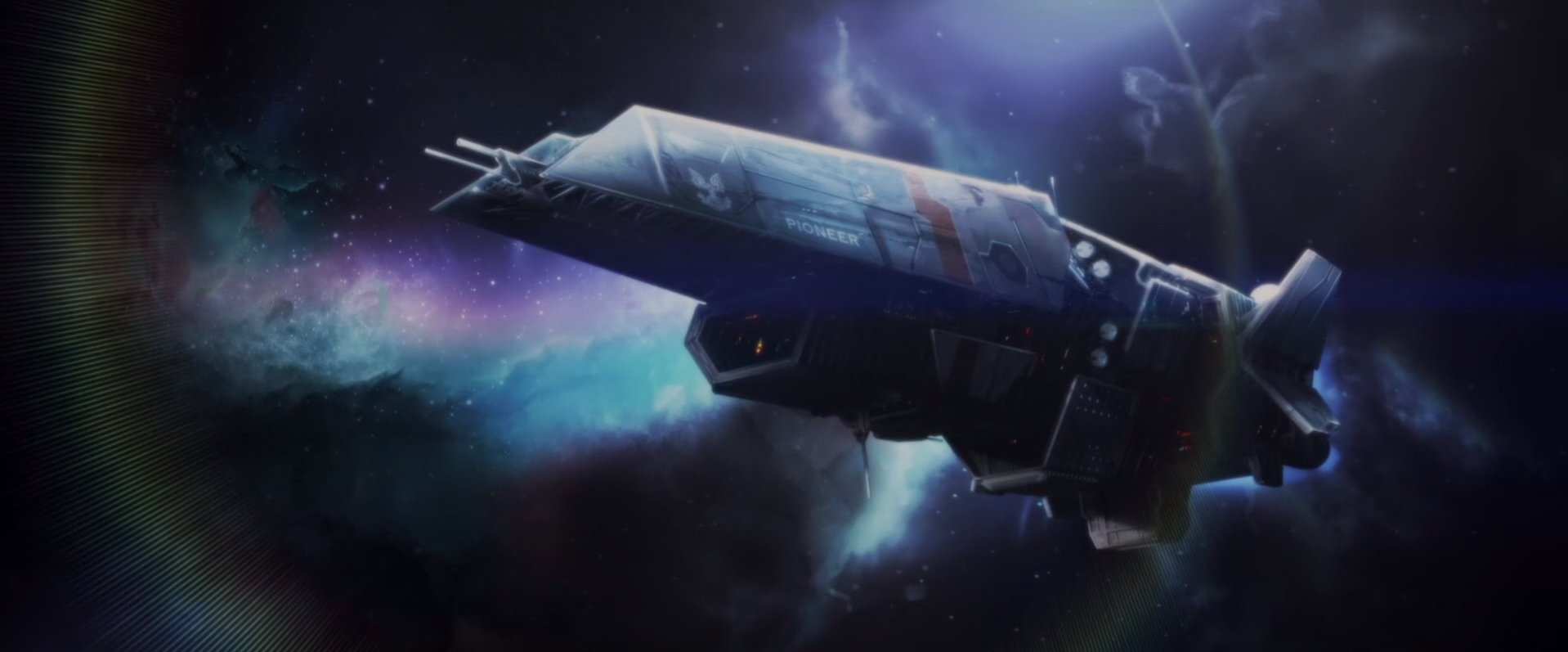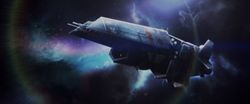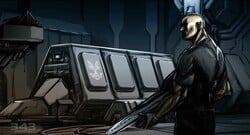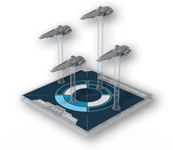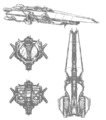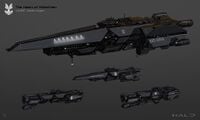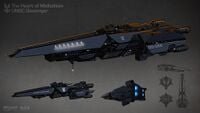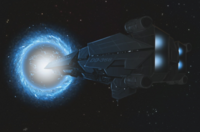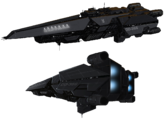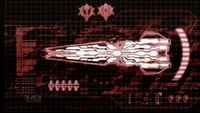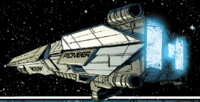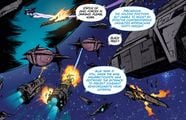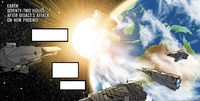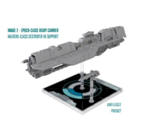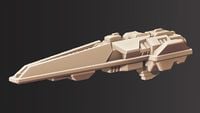Halberd-class light destroyer
From Halopedia, the Halo wiki
| Halberd-class | |||||||||||||||||||||||||||||
|---|---|---|---|---|---|---|---|---|---|---|---|---|---|---|---|---|---|---|---|---|---|---|---|---|---|---|---|---|---|

| |||||||||||||||||||||||||||||
| Class attributes | |||||||||||||||||||||||||||||
|
Identification: |
|||||||||||||||||||||||||||||
|
Operators: |
|||||||||||||||||||||||||||||
|
Manufacturer: |
|||||||||||||||||||||||||||||
|
In service: |
|||||||||||||||||||||||||||||
| |||||||||||||||||||||||||||||
The Halberd-class light destroyer is a class of destroyer in service with the UNSC Navy with a hull classification symbol of DD.[1] Manufactured by SinoViet Heavy Machinery,[2] the Halberd class was in service with the Navy during the Insurrection, throughout, and after the Human-Covenant War.[10]
As with other destroyer classes, the Halberd combines heavy armament with high speed and thick, high-quality armor. A relatively small class of warship, these destroyers can use wolfpack tactics to engage more powerful Covenant warships with coordinated MAC fire and hit-and-run attacks to overwhelm their target's often superior defenses.[2]
Overview[edit]
Design details[edit]
The Halberd-class destroyer features a distinctive "arrowhead" profile.[11] The hull of the Halberd class is reinforced with approximately two meters of Titanium-A armor,[9] with parts of the hull featuring components made up of Vanadium steel.[12] The hull is embedded with thermal superconducting radiators to more efficiently transfer the heat generated by the destroyers into space.[4] At 485 meters in length, the class is only seven meters longer than a Stalwart-class light frigate, yet it has almost double the mass at 1.8 million metric tons; this is due to the destroyer's thicker and higher-quality titanium hull that allows destroyers of this class to take a tremendous amount of damage.[6][7][1][9] Replacement armor plates can be quickly cut to shape and patched onto the ship at any naval depot, though any repairs to the destroyer's underlying structure often require the specialized care of a shipwright.[2] Fast and requiring only a small crew,[3] Halberd-class destroyers do not have as much armor as larger warships within the UNSC fleet. Though they lack general-purpose utility, the destroyers' heavy armaments compensate for this issue. The Halberd class has a modular design which allows them to be configured for different missions.[13][3]
Halberds are also equipped with an advanced sensor array, the Mk. 45 long-range fire director.[4] The destroyer class has a circular bridge with an array of display monitors for its crew.[11] Like all warships of the UNSC Navy, the bridges on Halberd destroyers give the ship's command crew visibility of surrounding space, as per naval design guidelines.[2] Later into the Human-Covenant War, Halberd-class destroyers were outfitted with an ε-pattern layout, providing an increased field of view.[4] Each destroyer of the class has two armories, each filled with an assortment of firearms and equipment.[14]
It took SinoViet Heavy Machinery at least four months to build and launch a Halberd destroyer, given that construction on UNSC Iroquois began sometime in 2551 and was launched in April 2552.[4]
Propulsion[edit]
Halberd-class destroyers are powered by high-thrust fusion drives located at the aft, with four primary and four secondary drives.[4] Powered by massive reactors, these fusion rockets generate both power and direct thrust with Deuterium and Helium-3 fuel mixed with Hydrogen or water reaction mass. The superheated exhaust is then redirected with thrust-vectoring plates and magnetic fields to increase the destroyer's maneuverability.[2]
The destroyer has six emergency thruster tanks strategically placed on hardened points of the hull.[15] Translight power is provided by a Shaw-Fujikawa Translight Engine, located in the destroyer's expansive engine room.[14] The aft of the Halberd-class has reinforced armored screens fitted to protect fusion drives and the slipspace engine.[4]
Crew and complement[edit]
Halberd destroyers are only crewed by 250 sailors, a relatively small crew for a ship of its size. They also carry a small complement of 50 Marines, enough for a single platoon.[2] The crew quarters are cramped with limited recreational facilities[4] and only basic kitchen facilities. Strictly utilitarian in design, each crew member is allocated a single sleeping pod, though some personnel may have to share the same pod with another when the ship carries additional personnel.[2]
The single hangar bay of the Halberd class is small and confined, with little maneuvering room for shuttlecraft.[11] When the Halberd-class destroyer was introduced, its hangar was considered state-of-the-art, featuring a specialized set of gravity generators that can decelerate incoming small craft,[2] which can also be reconfigured to fit an electromagnetic catapult launch assist that can quickly deploy shuttlecraft.[4] Traditional electromagnetic launch hooks and arrestor cables are still fitted, in case of emergencies.[2] This hangar can be used to host up to two Pelican dropships[2][11], with Halberds such as UNSC Iroquois typically not stocking any strikecraft escorts in their default complement.[9] In "wolf-pack" task forces, Halberd destroyers carry no Marine complement and instead exchange it for extra strikecraft. For example, the destroyers comprising the Task Force Pantea traded their Marine detachments for two squadrons of F-29 Nandaos.[8]
Armaments[edit]
Though these destroyers are not as heavily armored compared to other warships in the Navy's fleet, they are armed with enhanced weapons systems that make up for their relatively light defensive capabilities.[16] The Halberd-class destroyer's primary armament is a spinal-mounted 14B11R2 MAC battery, which is composed of twin-linked 1170mm/647mm (46"/25.5") high-velocity coilguns.[4] The primary MAC is capable of firing all standard munition packages, ranging from hyper-dense kinetic slugs to semi-autonomous drone missiles. The secondary, smaller coilgun is only capable of firing kinetic rounds. The MAC battery is powered by capacitor cells that can quickly be swapped out if the cells become damaged or degraded.[2]
The Halberd class is also armed with twenty-six oversized M58 Archer missile pods,[2][9] capable of holding a total of over eight hundred individual Archer missiles.[6][7] The class may also hold a payload of three Shiva-class nuclear missiles.[9] For defense against single ships, the destroyer class carries four twin-linked M870 Rampart point defense guns.[2] One of the most heavily armed classes of UNSC vessels, a group of Halberd-class destroyers is capable of engaging and inflicting heavy damage upon even the largest of Covenant ships.[6][7]
Usage[edit]
Like most UNSC destroyers, Halberds are primarily designed to work as specialised attackers,[2] with a focus on firepower at the expense of general utility.[3] Early in the Human-Covenant War, Halberds were deployed in specialised "wolf-pack" task forces with a life expectancy measured in weeks - expected to hunt down and harass Covenant capital ships behind enemy lines.[17] One such tactical formation commonly employed by the Navy in this era was the "Axe Formation", consisting of four Halberd-class destroyers in a given squadron.[18]
As the war dragged on, the versatile nature of the Halberd saw them increasingly deployed with minimal crew counts and used as escorts and defensive screens for larger capital ships.[6][7][3][2]
Ships of the line[edit]
- UNSC Armageddon's Edge - Served in battle around 2535.[11][Note 1]
- UNSC Chaco - Served as part of Task Force Pantea.[17]
- UNSC Cibola - Served as part of Task Force Pantea.[17]
- UNSC Halberd – The lead ship of the class.[19]
- UNSC The Heart of Midlothian (DD-366) – Destroyed near Algolis.[14]
- UNSC Herodotus – Destroyed during the Fall of Reach.[20]
- UNSC Iroquois (DD-906) – Heavily damaged during the Battle of Sigma Octanus IV, last seen at Reach.[12]
- UNSC Kayenta - Served as the lead of Task Force Pantea.[17]
- UNSC Mesa Verde - Served as part of Task Force Pantea.[17]
- UNSC Pioneer – Served as a staging ship for an operation against the United Rebel Front.[21]
- UNSC Rio Grande - Served as part of Task Force Pantea.[17]
Operational history[edit]
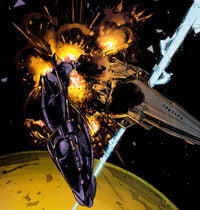
Insurrection and Human-Covenant War[edit]
The Halberd-class destroyer entered service in 2508 and was the most commonly deployed destroyer class during the later years of the Insurrection and throughout the Human-Covenant War.[3][22] Although these destroyers can be configured for a variety of mission types, resource shortages during the war led to most Halberds being configured purely for escort duty, with entire subsystems left out to reduce construction time and crew requirements.[13][3] Halberd-class destroyers engaged the Covenant as early as December 2525.[23]
Halberd-class destroyers were attached to Battle Group X-Ray in 2526. Numerous destroyers from X-Ray were assigned to "wolf-pack" task forces. The operable life expectancy of the destroyers in these task forces was several weeks. One such task force, Task Force Pantea, fought the Covenant over Netherop.[17] At least one was destroyed in the battle.[24] Despite their powerful armament and maneuverability, many fleet officers looked down upon destroyers, considering them too ineffective against Covenant ships. It was generally agreed that seven destroyers were an even match for four Covenant frigates.[9]
In early 2549,[25] one destroyer of this class, UNSC The Heart of Midlothian, participated in the Algolis Invasion, where she destroyed five Covenant ships when the self-destruct fail-safe was initialized after she was boarded.[14] Many Halberd-class destroyers participated in the Battle of Sigma Octanus IV, most notably UNSC Iroquois, which was captained by Commander Jacob Keyes. During the initial skirmish, Iroquois performed the daring Keyes Loop, destroying three Covenant warships in the process.[26] Several dozen destroyers later participated in the Fall of Reach as part of the Epsilon Eridani Fleet.[20]
Post-war service[edit]
Halberd-class destroyers continue to be in service with the Navy by 2557, with some serving with the UNSC Home Fleet over Earth.[5] In August 2558, a pair of Halberds served as escort for a cargo freighter in the Ephsu system.[27]
Halo: Fleet Battles[edit]
Axe Formation[edit]
This element includes four Halberd-class destroyers.
Non-canon and dubious canon appearances[edit]
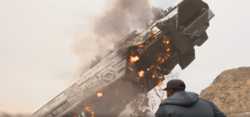
Silver Timeline[edit]
- Main article: Silver Timeline
| This article contains information about the Silver Timeline, and is not a part of the established Halo canon. |
Halberd-class destroyers are used by the UNSC Navy at WHITE TOWER.[28] One ship, the UNSC Pioneer participated in and was destroyed at the Battle of Eridanus II.[29] More would later participate in a battle at Halo.[30]
Production notes[edit]
The destroyer class was likely named after the halberd, a two-handed pole weapon used during the 14th and 15th centuries. A Halo Waypoint article for UNSC The Heart of Midlothian claimed that the Halberd destroyer has a mass of 7,900 metric tons,[1] a rather unrealistic weight significantly lighter than many modern auxiliary ships. This was later amended in Halo: Warfleet, giving the destroyer a mass of 1.8 million metric tons.[2]
Gallery[edit]

|
Browse more images in this article's gallery page. |
Concept art of the UNSC The Heart of Midlothian for Midnight in the Heart of Midlothian.
The destroyer UNSC Pioneer in Halo: Fall of Reach.
UNSC destroyers, with Autumn-class heavy cruisers and UNSC Infinity, over Earth
A Halberd-class destroyer with an Epoch-class heavy carrier in Halo: Fleet Battles.
Profile of the Halberd in Halo Mythos.
List of appearances[edit]
- Halo: The Fall of Reach (First appearance)
- Halo: The Cole Protocol
- Halo Legends
- Prototype (Mentioned only)
- Halo: Evolutions
- Halo: Fall of Reach
- Halo: Escalation
- Halo: Fleet Battles
- Halo: The Fall of Reach - The Animated Series
- Halo Mythos: A Guide to the Story of Halo
- Halo: Collateral Damage
- Halo: Oblivion
- Halo: Point of Light
- Halo: The Television Series Season One
- Halo: The Television Series Season Two
Notes[edit]
- ^ While never explicitly called a Halberd, it is described as having an "arrowhead-shaped nose", the first time a destroyer is described having such a feature, and a defining part of the Halberd's appearence
Sources[edit]
- ^ a b c d e f Halo Waypoint, UNSC The Heart of Midlothian (Retrieved on Mar 25, 2011) [archive]
- ^ a b c d e f g h i j k l m n o p q r s t u v w x y z aa ab Halo: Warfleet - Destroyers, page 32-33
- ^ a b c d e f g h i j k l m n o Halo Encyclopedia (2022 edition), page 124
- ^ a b c d e f g h i j k l m n Halo Mythos, page 82-83
- ^ a b Halo: Escalation, issue 10
- ^ a b c d e f Halo Encyclopedia (2009 edition), page 248
- ^ a b c d e f Halo Encyclopedia (2011 edition), page 259
- ^ a b Halo: Oblivion, chapter 12
- ^ a b c d e f g h i j Halo: The Fall of Reach, chapter 16
- ^ Halo Waypoint, Canon Fodder - Have S'moa (Retrieved on Oct 30, 2021) [archive]
- ^ a b c d e Halo: The Cole Protocol, chapter 1
- ^ a b Halo: The Fall of Reach, chapter 23
- ^ a b Halo Waypoint, Canon Fodder - Looking Glassed (Retrieved on Oct 30, 2021) [archive]
- ^ a b c d Halo: Evolutions - Midnight in the Heart of Midlothian
- ^ Halo: The Fall of Reach, chapter 17
- ^ Spartan Games, UNSC Halberd Upgrade Box (Retrieved on Jan 3, 2017) [archive]
- ^ a b c d e f g Halo: Oblivion, chapter 4
- ^ Spartan Games, HFB UNSC Stats Compiled.pdf (Retrieved on Aug 25, 2017) [archive]
- ^ Stephen Loftus on the Autumn class' talk page
- ^ a b Halo: The Fall of Reach, chapter 36
- ^ Halo: The Fall of Reach, chapter 9
- ^ Halo: Fall of Reach - Boot Camp
- ^ Halo: Collateral Damage, issue 2
- ^ Halo: Oblivion, chapter 19
- ^ Halo Encyclopedia (2022 edition), page 50
- ^ Halo: The Fall of Reach, chapter 18
- ^ Halo: Point of Light, chapter 8
- ^ YouTube - Paramount+, Halo The Series (2022) Official Trailer (Retrieved on Jan 30, 2022)
- ^ Halo: The Television Series, episode Reckoning
- ^ Halo: The Television Series, episode Halo
| ||||||||||||||||||||||||||||||||||||||||||||||||||||||||
